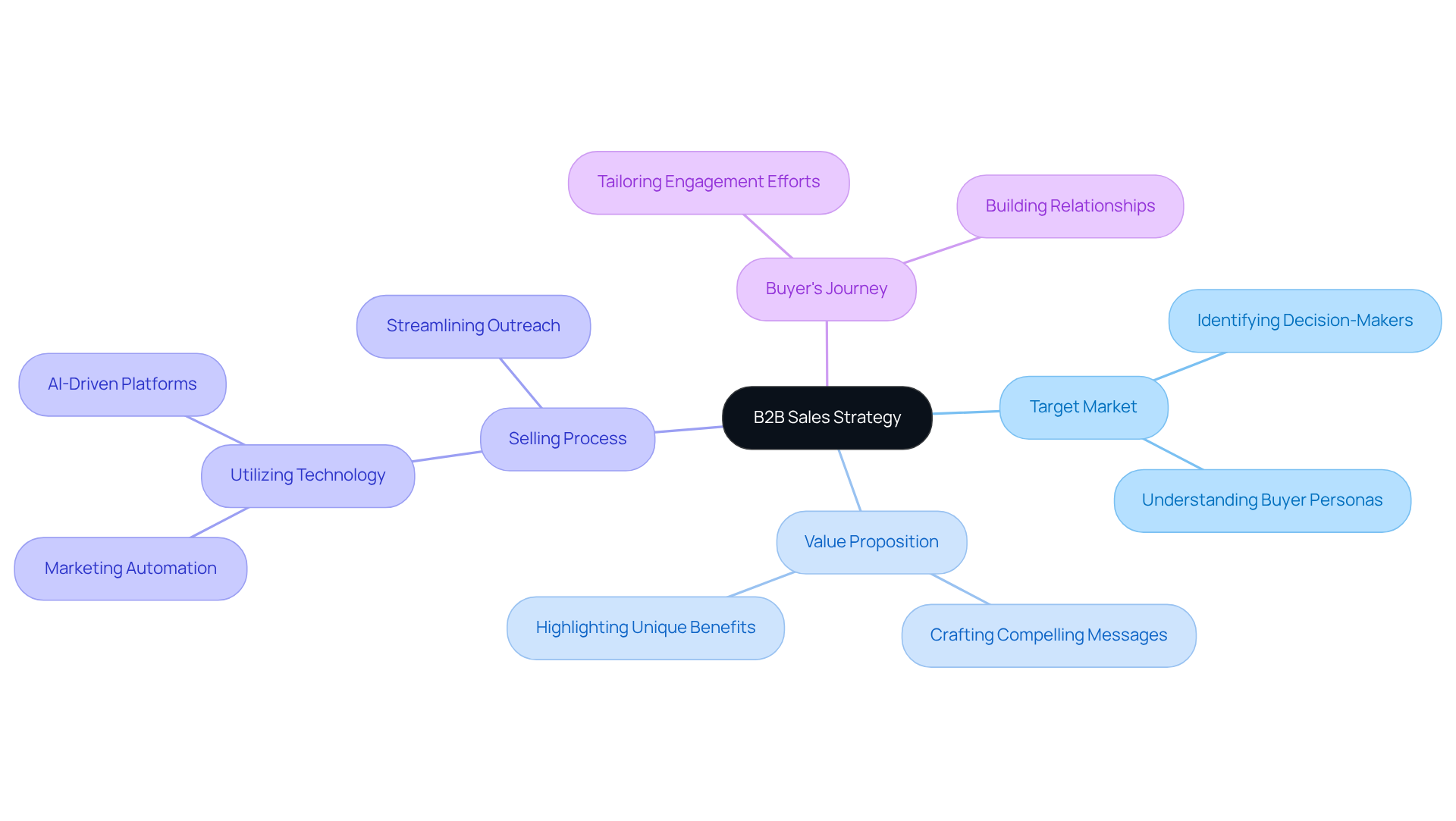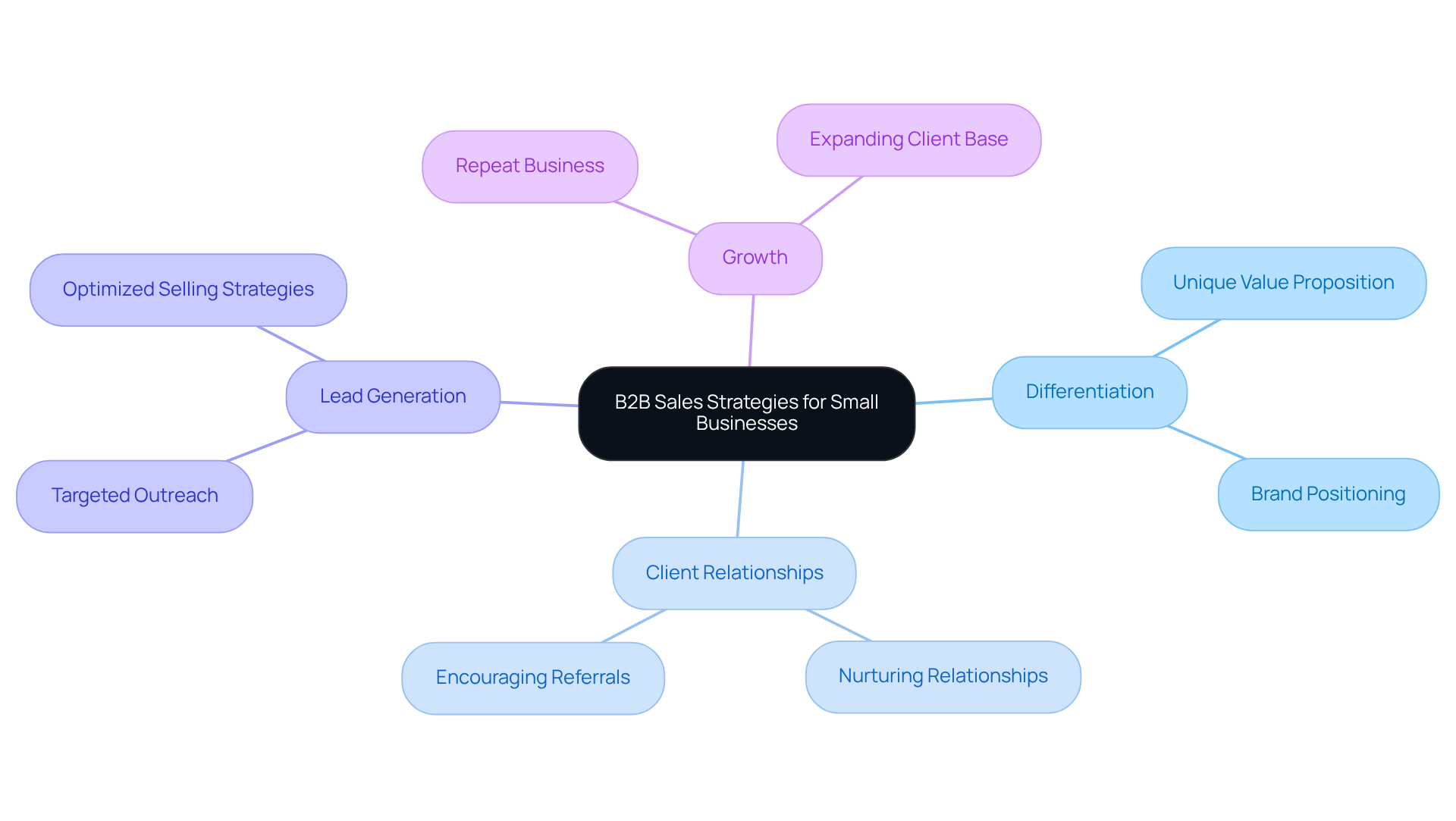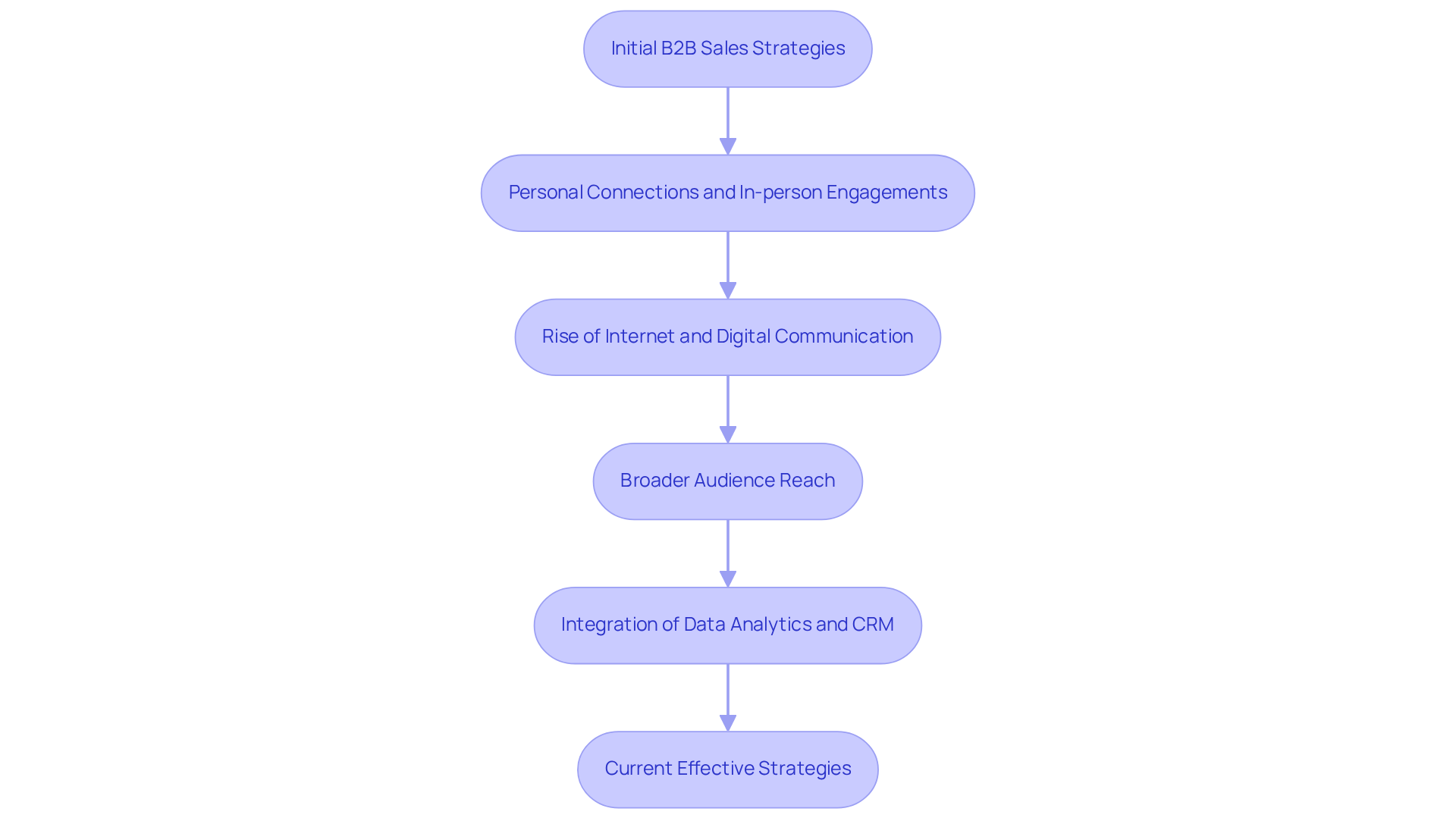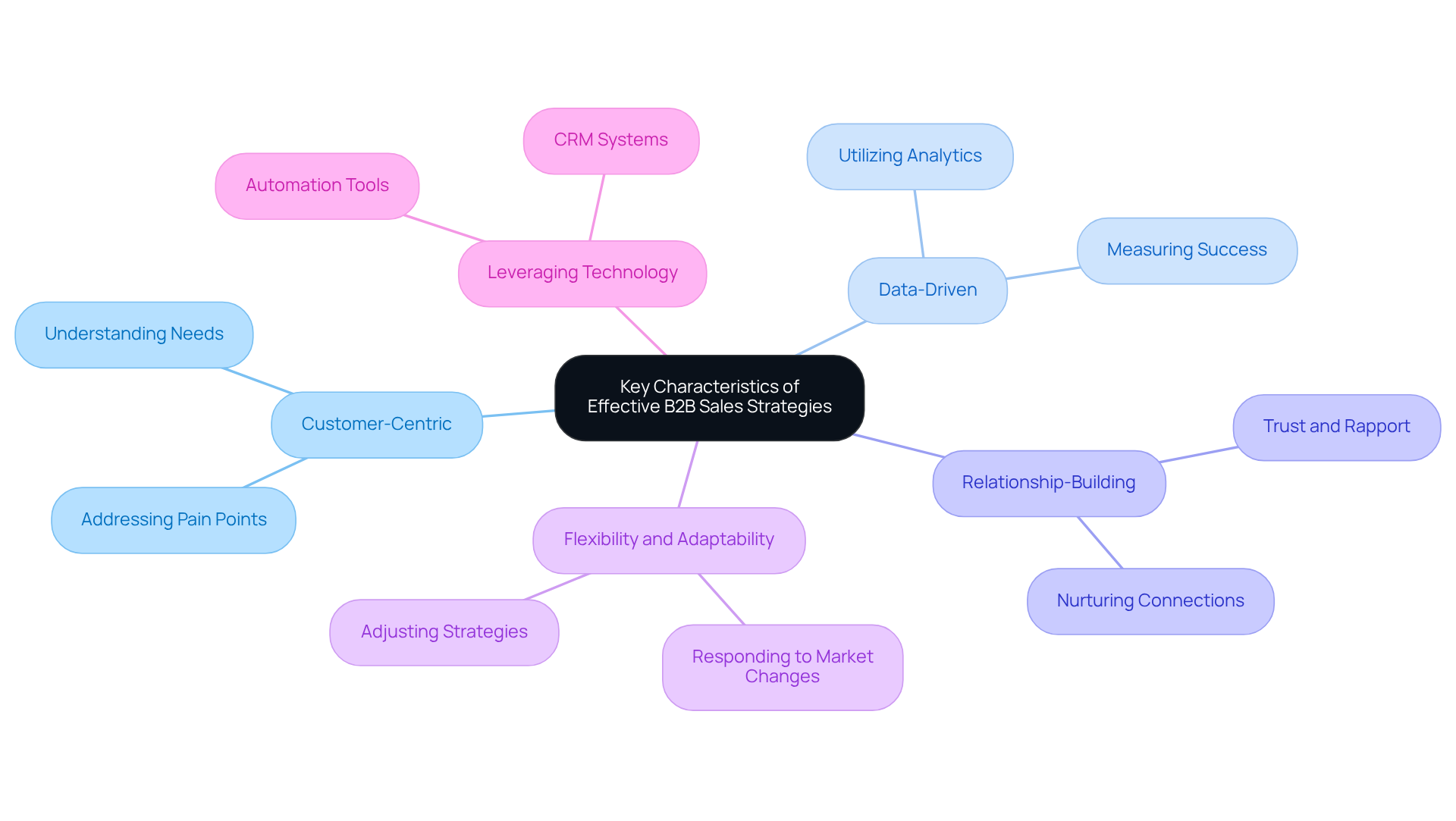Overview
In today's competitive landscape, we understand that having a well-defined B2B sales strategy is essential for businesses like yours to effectively showcase your products or services to other companies. This strategy not only focuses on identifying your target market but also emphasizes the importance of building meaningful relationships. How can these strategies truly make a difference? By enhancing customer engagement and fostering connections, they allow you to adapt to the ever-evolving market dynamics.
Imagine the impact of nurturing these relationships—it's about creating a network that supports your growth and success. As you implement these strategies, you'll find that they lead to sustained business success, providing you with the stability and confidence to thrive. Together, we can achieve this success, ensuring that your business not only survives but flourishes in the long run.
Introduction
Understanding the intricacies of B2B sales strategies is essential for businesses like yours that aim to thrive in a competitive landscape. These strategies not only define how companies connect with other businesses but also illuminate the path to nurturing valuable relationships and driving growth.
As the market evolves and technology reshapes buyer behavior, we recognize the challenges you face. How can organizations effectively adapt their sales approaches to meet the unique needs of their corporate clients?
Exploring the key components and characteristics of successful B2B sales strategies offers valuable insights into overcoming these challenges. Together, we can seize new opportunities for success.
Defining B2B Sales Strategy: Key Concepts and Components
A B2B sales strategy outlines a thoughtful approach that companies use to promote their products or services to other businesses. This strategy includes essential components such as:
- Identifying the target market
- Crafting a compelling value proposition
- Refining the selling process
Understanding the buyer's journey is crucial; it allows organizations to tailor their outreach and engagement efforts effectively.
Building strong relationships with decision-makers is vital, especially since B2B transactions often involve multiple stakeholders and longer cycles. Have you considered how technology, like marketing automation and AI-driven platforms, can enhance your outreach and improve engagement with potential clients? focuses on fostering lasting connections and is adept at meeting the unique needs of corporate clients, which can differ significantly from those of individual consumers.
With Wayy.ai, small business owners can simplify client acquisition through a one-click revenue playbook and targeted outreach, making the transaction process more efficient. Furthermore, daily email insights from Wayy.ai provide valuable metrics, such as:
- The number of leads reached
- Who showed interest
- The conversion rate
This information empowers companies to enhance their performance effectively. Together, we can navigate these challenges and achieve success in your B2B endeavors.

The Importance of B2B Sales Strategies for Small Businesses
For small enterprises, having is not just beneficial—it's essential. It empowers you to stand out in a crowded marketplace by clearly defining what makes your business unique. By adopting organized selling strategies, you can optimize your outreach efforts, connect meaningfully with potential clients, and transform leads into valuable transactions.
Moreover, a thoughtfully designed B2B strategy helps you nurture stronger relationships with your clients. This, in turn, fosters repeat business and encourages referrals, which are vital for your growth. In a time when many small enterprises struggle with lead generation, a targeted approach can significantly enhance your ability to attract and retain customers. Together, we can navigate these challenges and build a thriving business.

The Evolution of B2B Sales Strategies: A Historical Perspective
have undergone remarkable transformations over the decades, shaped by technological advancements, shifts in buyer behavior, and evolving market dynamics. Initially, marketing initiatives thrived on personal connections and in-person engagements. Yet, with the rise of the internet and digital communication, a new landscape emerged—one that allows companies to connect with a broader audience through online platforms. This shift not only expanded reach but also opened new avenues for meaningful engagement.
The integration of data analytics and Customer Relationship Management (CRM) systems has greatly enhanced B2B marketing approaches. These invaluable tools empower businesses to track customer interactions meticulously, analyze purchasing behaviors, and tailor their outreach based on actionable insights. For example, platforms like Wayy.ai illustrate this evolution, automating outreach processes and enabling users to establish over 60 target client connections each month without the burden of manual effort. This automation simplifies client acquisition and enhances marketing efficiency by ensuring timely and relevant communications.
Today, effective B2B strategies are characterized by a harmonious blend of traditional relationship-building methods and advanced digital tools. This dual approach highlights the necessity for adaptability in a rapidly changing environment, where businesses must remain agile to meet the needs of informed and tech-savvy buyers. As continues to evolve, those who develop a strong B2B sales strategy that embraces both historical practices and modern innovations will be best positioned for sustained success. Together, we can navigate these changes and achieve lasting growth.

Key Characteristics of Effective B2B Sales Strategies
Successful B2B sales strategy embodies several essential traits that can truly make a difference for small business owners like you. Firstly, they are customer-centric, placing a strong emphasis on understanding your specific needs and pain points. This focus is vital in ensuring that your challenges are recognized and addressed. Secondly, these approaches incorporate data-driven decision-making, utilizing analytics to inform outreach efforts and measure success. By relying on data, you can feel more confident in the strategies you implement.
Moreover, effective approaches highlight the importance of relationship-building. Trust and rapport are essential for long-term collaborations, and nurturing these connections can lead to meaningful partnerships. Additionally, flexibility and adaptability are crucial; after all, market conditions and buyer preferences can change rapidly. Being prepared to adjust your strategies can help you stay ahead.
Ultimately, efficient B2B approaches leverage technology, including and CRM systems, to optimize processes and improve communication with potential clients. By embodying these characteristics, you can significantly enhance your B2B sales strategy and improve your sales outcomes. Together, we can navigate these challenges and work towards achieving success in your business.

Conclusion
A well-defined B2B sales strategy is not just a framework; it’s a vital lifeline for businesses striving to connect meaningfully with other organizations. By honing in on essential elements like:
- Identifying target markets
- Developing a compelling value proposition
- Refining the selling process
companies can customize their outreach to truly resonate with the unique needs of corporate clients. This thoughtful approach not only strengthens engagement but also nurtures lasting relationships—relationships that are crucial for thriving in the competitive B2B landscape.
Throughout this article, we’ve highlighted key insights that showcase the importance of a robust B2B sales strategy, especially for small businesses. By emphasizing customer-centric practices, embracing data-driven decision-making, and integrating technology such as CRM systems and automation tools, businesses can optimize their sales processes. Moreover, understanding the historical evolution of B2B strategies reminds us of the need for adaptability in a fast-paced market, where traditional methods must harmonize with modern innovations.
Ultimately, the significance of a strong B2B sales strategy cannot be overstated. As organizations navigate the complexities of client acquisition and relationship management, embracing these strategies will not only enhance outreach efforts but also foster sustainable growth. Small businesses, in particular, can utilize these insights to distinguish themselves in a crowded marketplace and build meaningful connections that pave the way for long-term success. Together, we can navigate these challenges and achieve our goals.
Frequently Asked Questions
What is a B2B sales strategy?
A B2B sales strategy is a thoughtful approach that companies use to promote their products or services to other businesses, including components such as identifying the target market, crafting a compelling value proposition, and refining the selling process.
Why is understanding the buyer's journey important in B2B sales?
Understanding the buyer's journey is crucial as it allows organizations to tailor their outreach and engagement efforts effectively, leading to better connections with potential clients.
What role do relationships play in B2B sales?
Building strong relationships with decision-makers is vital in B2B sales because transactions often involve multiple stakeholders and longer sales cycles.
How can technology enhance B2B sales outreach?
Technology, such as marketing automation and AI-driven platforms, can enhance outreach and improve engagement with potential clients, making the sales process more efficient.
What is Wayy.ai and how does it assist small business owners?
Wayy.ai is a platform that simplifies client acquisition for small business owners through a one-click revenue playbook and targeted outreach, making the transaction process more efficient.
What metrics does Wayy.ai provide to enhance performance?
Wayy.ai provides daily email insights that include metrics such as the number of leads reached, who showed interest, and the conversion rate, empowering companies to enhance their performance effectively.




